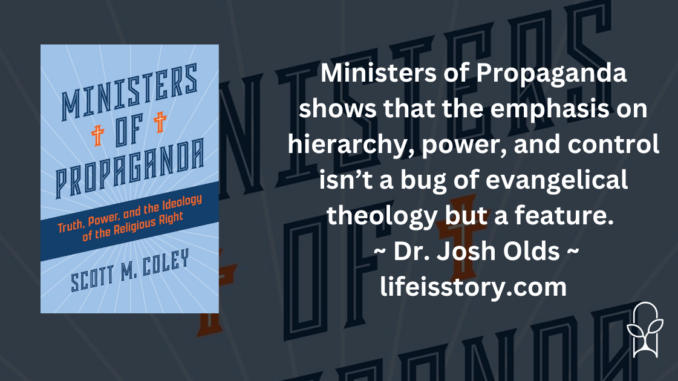
Published by Eerdmans on June 4, 2024
Genres: Academic, Non-Fiction, Politics, Social Justice
Buy on Amazon
Goodreads

Scott Coley exposes the inner workings of the religious right’s propaganda—and how Christians can resist it.
Good evangelical Christians are Republican. It seems like it’s always been this way.
That means the propaganda is working.
Scott Coley trains a critical eye on the fusion of evangelicalism and right-wing politics in Ministers of Propaganda. This timely volume unravels rhetoric and biblical prooftexting that support Christo-authoritarianism: an ideology that presses Christian theology into the service of authoritarian politics. Coley’s historically informed argument unsettles evangelical orthodoxy on issues like creation science or female leadership—convictions not as unchanging as powerful religious leaders would have us believe.
Coley explains that we buy into propaganda because of motivated reasoning, and when we are motivated by perceived self-interest, the Christian message is easily corrupted. But if we recover Jesus’s commandment to love our neighbors as ourselves, right-wing propaganda will lose its power. Any reader troubled by American evangelicals’ embrace of racism, misogyny, and other unchristian views will find answers and hope in these pages.
The inside flap of Ministers of Propaganda: Truth, Power, and the Ideology of the Religious Right reads in large, emblazoned letters: “Good evangelical Christians are Republicans. It seems like it’s always been that way. That means the propaganda is working.” With passion, wit, sincerity, and depth Scott M. Coley exposes white evangelicalism’s craven grasp for power—what Coley terms as Christo-authoritarianism. Ministers of Propaganda shows that the emphasis on hierarchy, power, and control isn’t a bug of evangelical theology but a feature and that the fascist tendencies of evangelicalism aren’t new to the Trump era of politics but rather that Trumpism more clearly exposed what had always been there. More importantly, Coley offers a solution to Christo-authoritarianism that is rooted in Christ—an alternative way of living and being that leads to human flourishing.
To call this book timely would be trite. We all know that it’s timely. It’s been timely for a decade now and, it appears, will be timely for who knows how long to come. Published in June 2024, Ministers of Propaganda was written with the specter of a second Trump term only looming. Part of it, I’m sure, was a cautionary tale against allowing what has happened to happen. Unfortunately, the propaganda worked. But Coley is also crystal clear that this is not just about Trump.
The most interesting part of the book is Coley’s focus on evangelicalism’s acceptance of young earth creationism (YEC). Coley uses YEC as a prime example of evangelicalism’s bent toward purposeful anti-intellectualism and how YEC has been used to engender the habit to reject scientific consensus when that consensus is in tension with the social, moral, or political goals of the religious right. Coley spends two chapters on the concept, detailing the history of YEC and how it actually stood at odds with accepted orthodoxy and even early evangelical theology. But what YEC allowed was for a belief model that challenged “secular” science—a model that has continued in areas of climate change, gender identity, vaccine efficacy, the reality of COVID, and many other areas. YEC is no longer on the forefront of the “culture war” debate but Coley is able to show how that argument in the latter part of the twentieth century led to the anti-science evangelical culture we have today.
Attached to YEC and also prominent in evangelical foundations is the concept of racial hierarchy. Again, Coley doesn’t focus as much on the current issues of evangelicalism’s problems with critical race theory, “wokeness,” antiracism, efforts to reform policing, or other such racial issues, but instead points to the past foundations to illuminate the present conflict. He thoroughly makes the case that evangelicalism was largely a defender of slavery and segregation. While its expression of racial hierarchy has changed over time—though even then we get John MacArthur saying there could be “biblical slavery” in modern times in 2012—the foundational root of white supremacy remains strong within most of evangelicalism.
Ministers of Propaganda uses all of this historical background to show how this has led evangelicalism into Christo-authoritarianism and explains evangelicalism’s bent toward antidemocratic politics. Coley spends a lot of time here on economic theory and, if I had to offer one criticism of the book, it’s that this section seems to meander a bit and not fully circle back around into his primary thesis. Don’t get me wrong, Coley is absolutely correct that, beginning with Reagan, evangelical economic policy has favored the rich, resulting in economic disparity and injustice we see today, but that explanation is long-winded and doesn’t firmly tie into the thesis of antidemocratic politics—though I see where Coley’s trying to take it.
But Ministers of Propaganda does not leave us without hope. Coley concludes the book by saying “I am hopeful that once they see Christo-authoritarianism for the nihilistic, self-serving, and anti-Christian ideology that it is, a critical mass of younger evangelicals—many of whom have already begun the painful process of disentangling their faith from the politics of their parents’ generation—will have the courage to walk away from the religious right and never look back.” And that is, indeed, what I have seen as a pastor and public theologian who has also walked that walk away from the religious right. The question that remains is what we walk toward. Coley centers that answer on a “pursuit of justice over and against the pursuit of social arrangements that reinforce my own power and privilege.” And that is, indeed, the heart of the Gospel.
